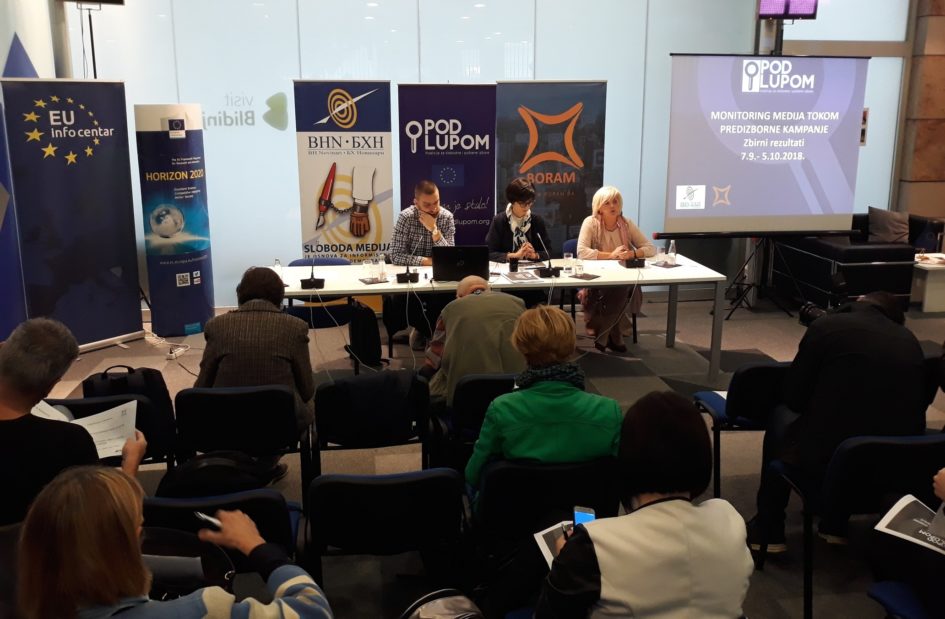
SARAJEVO, 17.10.2018. – Biased reporting, under-representation of female candidates and dominant presence of elected officials and ruling parties in the media, are some of the conclusions of the second preliminary media monitoring report during the 2018 election campaign.
Monitoring is organized whit the aim to determine whether and how many media contribute to the citizens making an informed choice, and whether the media is reporting in the interests of political subjects or in the interests of citizens. Professor Lejla Turčilo, the author of the methodology and the preliminary report, presented the key observations of media monitoring in the period from September 7, the beginning of the pre-election campaign, until October 5, ie until the day of electoral silence.
„According to the monitoring indicators, we can not claim that the media, and in particular the public services, provided sufficient information to the citizens, which would enable them to provide an informed choice“, said Turčilo and added that inappropriate speech was present bio in a relatively small percentage of media content, not counting visitors’ comments on news portals.
Of the analyzed 22,566 media content published during the election campaign, there were 5,290 election content, or 23 percent, of the electoral content. In public services, this percentage ranged from 1 to 3 percent, while in private media facilities there were 5-6 percent of electoral content.
The media kept on the mere reporting on the activities of political subjects. Journalists are largely the authors of election-related stories, with a smaller share of broadcasting of political subjects (5.6 percent). In 53.55% of the content, journalists are signed as authors of texts or contributions, while in less than a third of the content the authorship is not specified at all.The qualitative analysis of data obtained through media monitoring has shown two forms of media bias towards political entities. Mild bias implied the use of affirmative language and disproportionate right to reply through disproportionate representation of political subjects, favoring particular political subjects.
„It was easier to analyze open bias because it was characterized by promotional contributions of political parties, framing and casting, and masking the function of a collocator“, enphasized Borislav Vukojević, researcher and master of communicology.
Inappropriate speech was one of the subthemes analyzed within the media montioring and its share in electoral content (8.3 percent) was lower than in previous campaigns.
“The ones who used inappropriate speech were mostly non-political actors, ie political subjects and representatives, and there was a noticeable trend of lack of journalists’ reaction to inappropriate speech, especially in live broadcasts,” Vukojević added.
When it comes to female candidates, in the monitored election content they are present in 15% of cases, which says they are significantly subordinated. The media’s relationship towards female candidates was largely neutral.
The three most common political subjects in media content analyzed are the political parties SDA, SNSD and HDZ, while the new subjects of the political scene in BiH have significantly fewer opportunities and venues to appear in the media. Large and established parties that are already taking part in the government have had the largest space in the media, which is explained by the fact that their members are the carriers of public functions.
Media monitoring during the election campaign of the 2018 General Election is conducted on a sample of 30 private and public media (5 printed, 15 electronic and 10 informative online news portals), from 7 September to 10 October 2018. It is realized within the framework of the BASE project – Building Responsibility and Systems in the Elections – funded by the European Union and USAID and implemented by the consortium of BH Journalists Association – Boram and Coalition “Pod Lupom” .